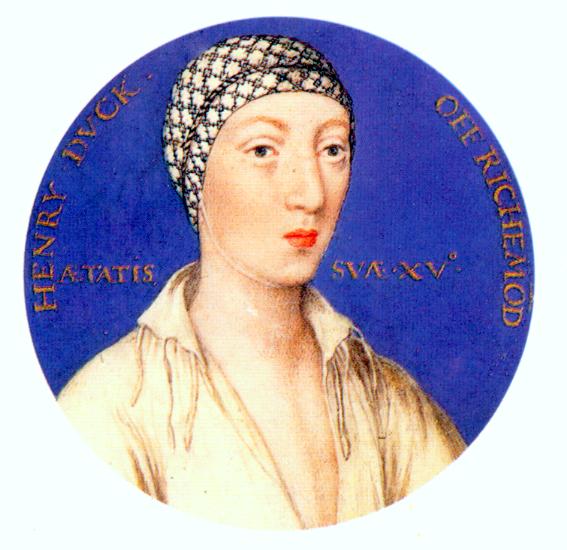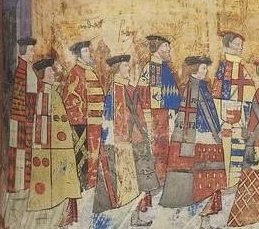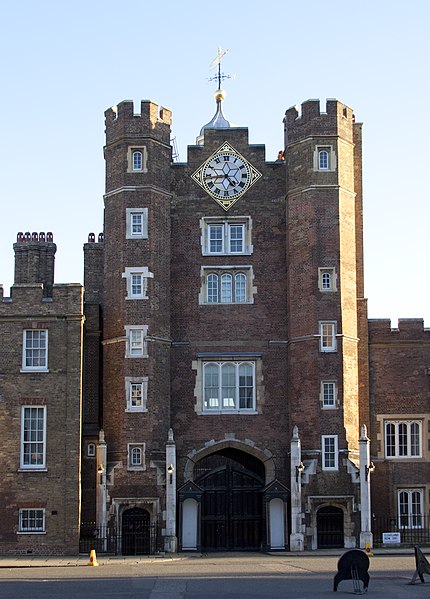 |
| Henry Fitzroy |
By January
1534 Henry and Anne were expecting their second child. For the New Year
exchange of gifts Fitzroy gave his father a ‘great spoon of gold’ weighing 4 oz[i].
In return Fitzroy received more silver gilt and Anne gave her stepson a silver
salt and ring. Fitzroy took a liking to the ring and wore it frequently. This
could of course have been a political ‘liking’.
Mary gave her father-in-law a ‘tablet’
of gold and in return was given something from his store of gifts he kept
squirrelled away.
In March
1534 Henry downgraded Catherine’s status to that of his brother’s widow and his
marriage to Anne was ratified. The succession was secured on the first male
child of Henry’s union with Anne. In the event of no male children then
Elizabeth was to inherit the throne. The Act of Succession made it clear that only legitimate
children could inherit the throne, putting paid to any ideas Fitzroy may have
had.
 |
| Henry Courtenay (2nd left) |
Fitzroy
started taking part in official occasions; he attended parliament 33 times out
of 46. He took the sovereign’s chair at the Order of the Garter at the annual
Feast of St George in April at Windsor, deputising for his father. That summer
Fitzroy visited his manor of Canford[ii]
in Dorset and then one of his manors in
Sheffield.
Eight months
into her pregnancy Anne miscarried and she and Henry set out on the annual progress. Anne objected to her husband taking his pleasures with the ladies of
the court and Henry rebuked her. Meanwhile he was getting very touchy about
others claiming the right of inheritance. When the king’s cousin Henry Courtenay[iii] claimed that he would be next in
line to the throne he was thrown into prison.
Towards Adulthood
 |
| Philippes de Chabot |
Henry
increased Fitzroy’s visibility at court; he played host at the St Andrew’s Day
Feast in honour of the French Admiral Philippe de Chabot. In February 1535 he hosted Chapuys when Henry was in
council; in May he attended the execution at Tyburn of three Carthusian monks, along with
‘Several other lords, and
gentlemen courtiers, were present at the execution, openly and quite close to
the victims’[iv]
a shocked
Chapuys recorded.
Norfolk was
now a power in Fitzroy’s life; he was Fitzroy’s Vice-Admiral and he was
guardian of Fitzroy’s half-brother George Tailboys, who had been adjudged a
lunatic. In addition Norfolk held the wardship of Fitzroy’s uncle George. Many
of Fitzroy’s servants had links to the Howard family.
Norfolk
helped Fitzroy out with his household matters. In 1535, when there were
problems in Fitzroy’s landholdings in the Welsh Marches, Norfolk travelled with him to Holt to advise on addressing the issues.
In 1536 Henry gave Fitzroy Baynards’ Castle as his London home. He and Mary were to take up
residence there, an indication that at 17, Fitzroy was to be considered an
adult.
Death of a Queen
 |
| Jane Seymour |
It did not
take long for Henry to tire of his new wife, who, as her insecurities grew,
lashed out at her husband when things did not go her way. She also hit out at
her uncle Norfolk. Henry for his part soon tired of these outbursts of temper
and the continued failure on Anne’s part to deliver herself of a son. Once
again in early 1536 Anne disappointed her husband with another miscarriage; the
child was a boy.
By early
1536, Henry had found himself a new love; one of Anne’s ladies-in-waiting, Jane Seymour. He needed a reason for a divorce and his henchman Cromwell
soon found one for him; Anne was guilty of adultery with four other men and
into the bargain was guilty of incest with her brother Rochford.
On the night
of Anne’s arrest Henry had Fitzroy brought to him to say goodnight. The king
embraced his son and wept as he told him that he and his half-sister Mary
should thank God for escaping;
‘That cursed and venomous
whore, who tried to poison you both.’[v]
On 19th
May Anne was beheaded[vi];
the clearly ailing Fitzroy was one of the nobles present at the execution.
Others witnessing Anne’s death were Cromwell and his son, the Lord Chancellor and the Duke of Suffolk[vii]. Anne’s uncle stayed away.
Death of a Blameless Youth
In May 1536
the news that Fitzroy had been made Chamberlain of Chester[viii]
and North Wales was sent to the king’s uncle, Arthur Plantagenet, in Calais; by his man Husee;
‘My Lord of Richmond is
Chamberlain of Chester and North Wales.’[ix]
In addition Fitzroy was
given the post of Warden of the Cinque Ports and Constable of Dover Castle[x].
He also busied himself trying to obtain, the stewardship of Banbury, for his servant Giles Forster. Unfortunately the post had already been
promised to Cromwell.
In June 1536
the Second Act of Succession was passed; making Elizabeth
illegitimate as well as Mary. This left Henry without any legitimate children,
but the act gave Henry ‘full and plenary
power and authority’ to choose who would succeed him if he died without an
heir of his body, by naming his successor in letters patent or in his last will[xi].
Fitzroy attended parliament on 8th June; carrying his father’s ‘cap of maintenance’. After the
proceedings Fitzroy joined the lords for dinner at York Place.
 |
| St James Palace |
In July
Fitzroy fell sick and his condition deteriorated daily; on 23rd July
Fitzroy died suddenly, at St James Palace, of an acute pulmonary complaint. Henry
was convinced that Anne had poisoned his son by means of a slow-acting poison,
a suspicion shared by others. The chronicler Charles Wriothesley wrote;
‘It was thought that he
[Richmond] was privily poisoned by the means of Queen Anne and her brother Lord
Rochford, for he pined inwardly in his body long before he died.
God knows the truth: he was a goodly young lord and [forward] in many qualities
and feats.’[xii]
Henry ordered
that Norfolk organise the funeral, while Cromwell’s man John Gostwick was to make an inventory of Richmond’s goods and chattels.
Most of Richmond’s goods were sent direct to the King’s Jewel House in Westminster.
The day
before Fitzroy’s death Chapuys reported to his master;
‘He [Henry] has no hope of
the Duke of Richmond, whom he certainly intended to be his heir, living long;
so fully did he mean this, that, had he [Richmond] not fallen ill, he would
have had him proclaimed by parliament.’[xiii]
Henry
appears to have ordered Norfolk to bury the body secretly; Fitzroy’s body was
wrapped in lead and hidden under a bundle of straw in a wagon. The body was
carried to Thetford, accompanied by two servants dressed
in green. Norfolk had Fitzroy buried at Thetford Priory where the Howards were entombed. Surrey was at his father’s
side during the funeral of his childhood friend.
Faithful to the End
 |
| Henry Howard, Earl of Surrey |
Surrey
grieved for the loss of his friend; over a year later he was still in mourning
and, according to his father, was;
‘Very weak, his nature
running from him abundantly [whenever Surrey] thought of my lord of Richmond.’[xiv]
The marriage
between Mary and Fitzroy had never been consummated and Henry used that excuse
to now deny Mary her dower rights. In 1537 Fitzroy’s playmate Surrey was
imprisoned in Windsor Castle for treason[xv].
While there he wrote a lament recalling happier days playing with Fitzroy;
‘So cruel prison how could
betide, alas!
As proud Windsor? where I in
lust and joy,
With a King’s son my
childish years did pass,
In greater feast than
Priam’s sons of Troy…
O place of bliss! Renewer of
my woes!
Give me account! Where is my
noble fere [Duke of Richmond]
Whom in thy walls thou didst
each night enclose.’[xvi]
Bibliography
The Lisle
Letters – Muriel St Clare Byrne (ed), Penguin Books Ltd 1989
The Ebbs and
Flows of Fortune – David M Head, University of Georgia Press 2009
House of
Treason – Robert Hutchinson, Phoenix 2009
Henry VIII –
Robert Lacey, Weidenfeld & Nicholson & Book Club Associates 1972
The Earlier
Tudors – J D Mackie, Oxford University Press 1992
Bastard
Prince – Beverley A Murphy, Sutton Publishing 2001
Rivals in
Power – David Starkey, MacMillan London Ltd 1990
The Six
Wives of Henry VIII – Alison Weir, Pimlico 1992
The Lost
Tudor Princess – Alison Weir, Vintage 2015
www.wikipedia.en
[i]
Promptly deposited in the Jewel House; in today’s prices worth £3,479.80
[iv]
Bastard Prince - Murphy
[v]
The Six Wives of Henry VIII - Weir
[vii]
Husband of Henry’s sister
[ix]
The Lisle Letters - Byrne
[x]
Previously held by Anne’s brother George
[xi]
It was superseded in 1543 by the Third Succession Act, which returned Henry's
daughters into the line of succession to the throne, but did not restore their
legitimacy.
[xii]
House of Treason - Hutchinson
[xiii]
The Lost Tudor Princess - Weir
[xiv]
House of Treason - Hutchinson
[xv]
Surrey was to find himself in the Tower on a number of occasions due to his
rash behaviour and was executed on 19th January 1547, nine days
before Henry VIII’s death
[xvi]
Rivals in Power – Starkey
unfortunately in those days any minor complaint could become serious and turn to pneumonia. i wonder whether there's enough remains if he was wrapped in lead to determine a cause of death; it would be interesting to exhume him and do an autopsy.
ReplyDelete